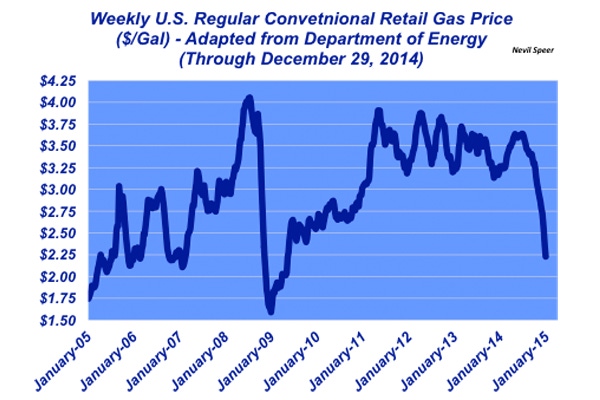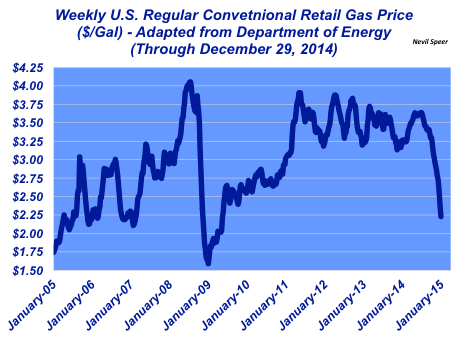Cheaper fuel prices should equate to improved consumer spending for other items and help boost the economy.
December 31, 2014

Perhaps the most important global economic development in 2014 has been the sharp decline in gas prices. The crude oil market is currently at its lowest level since 2009. This means sharply lower prices at the fuel pump. Meanwhile, natural gas has also plummeted in recent weeks.
From a direct perspective, cheaper fuel prices should equate to improved consumer spending for other items and help boost the economy. That ultimately could become a virtual loop: more spending means a better economy, a better economy means more spending.
That perspective is underscored even further from a psychological perspective. That is, cheaper gas also helps improve consumer confidence. Several years ago, when gas prices were rising, the opposite effect was at work. At the time, I noted that John Eichberger, vice president of motor fuels for the National Association of Convenience Stores, explained the effect of rising fuel prices this way: “… for the consumer it’s emotional, not necessarily a logical purchase. They go to extraordinary measures [to avoid higher prices].” In other words, rising gas prices, or even the perception of them, may assert their bite on take-home income, which potentially curbs confidence and overall consumer spending. Meanwhile, the same phenomenon is as work in the opposite direction: lower fuel prices boost confidence and spending.

Those energy market events possess two important implications for the beef industry:
First, it provides some relief when it comes to input costs; it’s less expensive to operate machinery including trucks, tractors, steam flakers, etc.
Second, and equally important, is the influence on the consumer. Lower gas prices ultimately mean more disposable income for all of us.
How do you perceive the impact of declining fuel prices on the economy? How will it, or how has it, impacted your operation? What impact do you foresee this might have on consumer spending – in particular, with regards to restaurant visits and beef’s competiveness at the grocery store? Do you think lower prices will be sustained, or is it a relatively short-lived phenomenon where the market will find some equilibrium at higher levels from here? Leave your thoughts in the comment section below.
Nevil Speer serves as a private industry consultant. He is based in Bowling Green, KY, and can be reached at [email protected]
You might also like:
Breathtaking photos of winter on the ranch
6 tips for buyers & sellers at a cattle sale
Prevention and treatment of cow prolapse
Bale grazing lets cows feed themselves
About the Author(s)
You May Also Like





